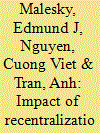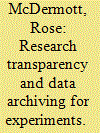| Srl | Item |
| 1 |
ID:
131505


|
|
|
|
|
| Publication |
2014.
|
| Summary/Abstract |
Comparative political economy offers a wealth of hypotheses connecting decentralization to improved public service delivery. In recent years, influential formal and experimental work has begun to question the underlying theory and empirical analyses of previous findings. At the same time, many countries have grown dissatisfied with the results of their decentralization efforts and have begun to reverse them. Vietnam is particularly intriguing because of the unique way in which it designed its recentralization, piloting a removal of elected people's councils in 99 districts across the country and stratifying the selection by region, type of province, and urban versus rural setting. We take advantage of the opportunity provided by this quasi experiment to test the core hypotheses regarding the decision to shift administrative and fiscal authority to local governments. We find that recentralization significantly improved public service delivery in areas important to central policy-makers, especially in transportation, healthcare, and communications.
|
|
|
|
|
|
|
|
|
|
|
|
|
|
|
|
| 2 |
ID:
131533


|
|
|
|
|
| Publication |
2014.
|
| Summary/Abstract |
Although still more common in medical studies and some other areas of social science such as psychology and behavioral economics, experimental work has become an increasingly important methodology in political science. Experimental work differs from other kinds of research because it systematically administers a specific treatment to part of a population while withholding that manipulation from the rest of a subject pool. The best studies strive to keep all other aspects of the experiment similar, so that any emergent difference between the treatment and control group that emerge provide unparalleled traction in determining causal inference. Many other valuable forms of social research use observation of the natural world, rather than depending on intervention to advance understanding. Because experimentalists can create the environment or process they want to study, this strategy of intervention and manipulation constitutes the main distinction between experimental work and other forms of social observation.
|
|
|
|
|
|
|
|
|
|
|
|
|
|
|
|